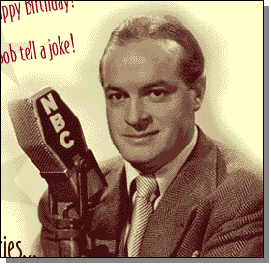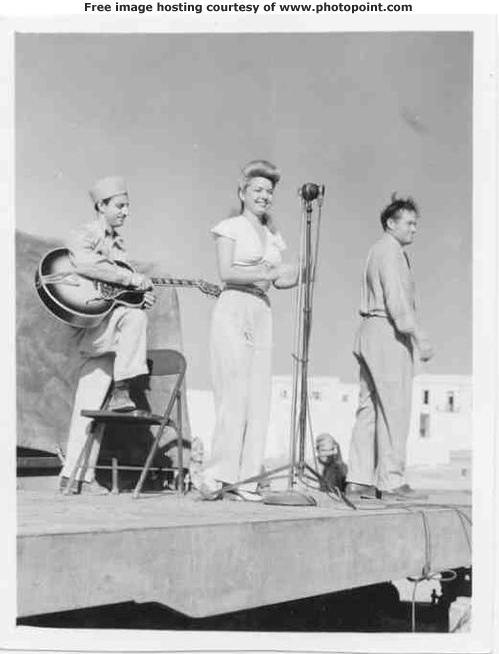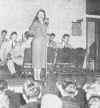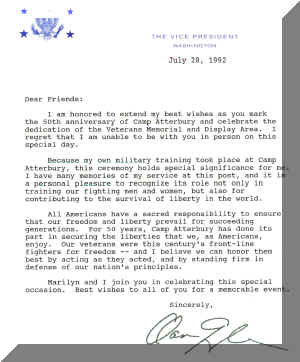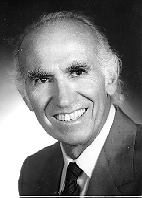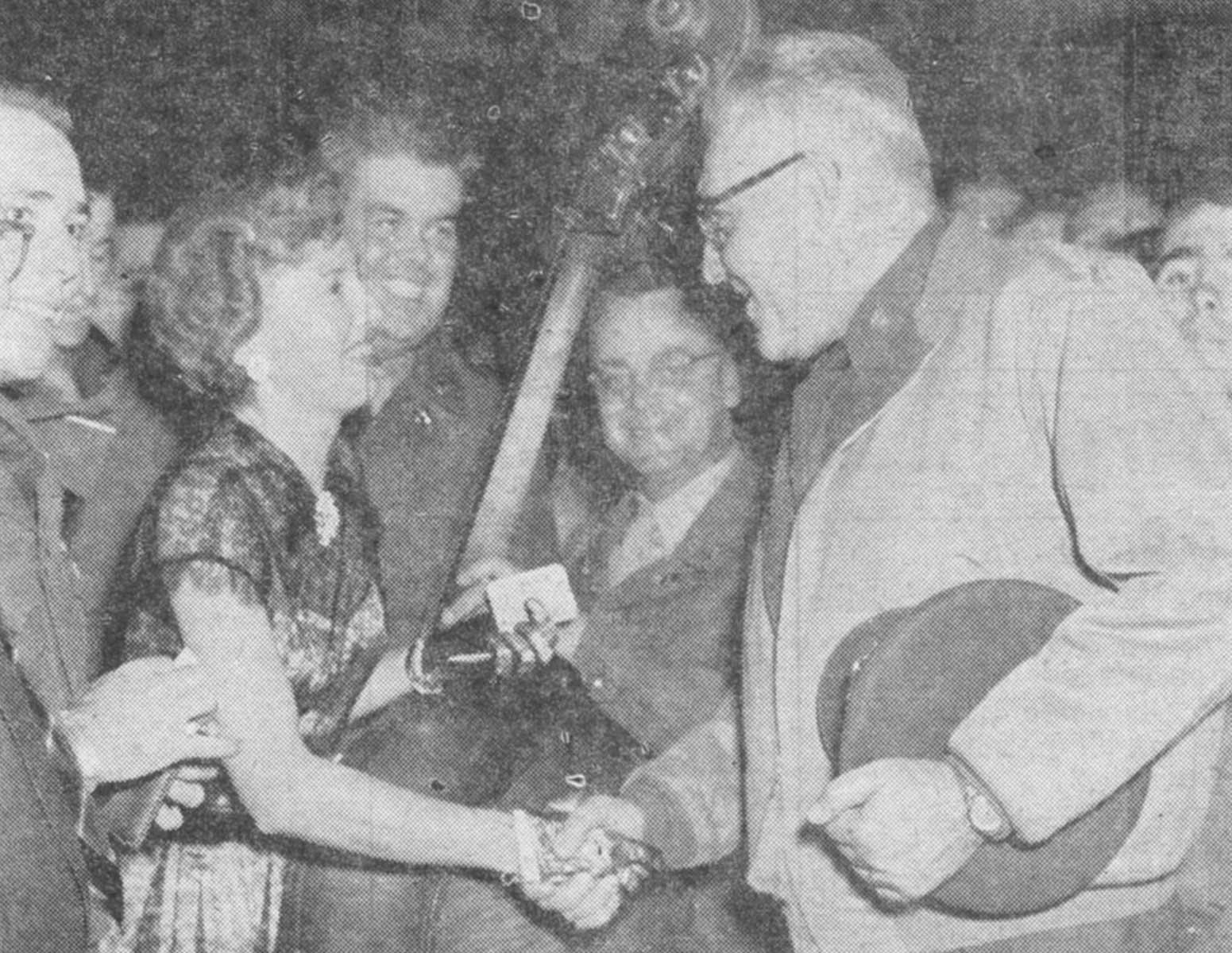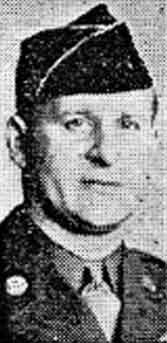|
Famous
and Influential Persons |
|||
Walter Abel Visited Wakeman General & Convalescent Hospital, 10/1944 with "Rags" Ragland, Ann Richards, Nancy Walker, Marvin Herschman and Brian Donlevy. A familiar character face in movies and television, Walter Abel was a dedicated stage actor who had studied at the prestigious American Academy of Dramatic Arts in New York before moving on to a progression of stage work that culminated in his first appearance on Broadway in the original play "Forbidden" in late 1919. The year before he had just dabbled in the relatively new film industry doing Out of a Clear Sky (1918) directed by prolific silent actor and director Marshall Neilan. Abel did just one other silent and then moved back into serious stage work for ten years (including doing some road productions in 1924) before once again surfacing in film for the first sound version of the play Liliom (1930). Perhaps he was enticed with doing the play on film, but his was a small part and the sound of early talkies - as usual - was lousy. Once again Abel returned to Broadway and worked steadily from late 1930 into part of the 1934 season. He would have some 40 Broadway roles in his career. |
|||
|
Jerry Colona |
|||
|
Blue Baron - Cruising Down The River lyrics Blue Barron, nationally know orchestra leader at Atterbury Assigned to Service Co, 424th Infantry Regiment. May 19, 1944
|
|||
|
PENCE ACCOMPANIES CHENEY ON AIR FORCE TWO
FOR VISIT TO CAMP ATTERBURY Congressman, Vice President attend Friday rally for Indiana Air and Army National Guard Washington, Nov 5, 2006 U.S. Congressman Mike Pence today attended a rally for Indiana soldiers with Vice President Dick Cheney at Camp Atterbury in Edinburgh, Indiana. "It is a distinct honor and privilege to welcome Vice President Dick Cheney to Camp Atterbury and the 6th District," said Pence. "Vice President Cheney is one of America's heroes in the War on Terror, and it will be an honor to stand beside him as we thank the Indiana Air and Army National Guard for their sacrifice and commitment to freedom." |
|||
| Rosemary Clooney | |||
|
|
|
||
| Rosemary Clooney worked at Wakeman General Hospital teaching patients to sing, as a means to regaining their voice following severe throat and jaw surgery. She died in 2002. Reported by Anne Blocker, daughter of Col. Blocker, Plastic Surgeon at Wakeman during this time. WW2 | |||
|
May 26, 1944
-
Van Mungo,
former league hurler, takes mound at Atterbury. Assigned to Post Special
Services.
|
|||
| Xavier Cugat | |||
|
General Benjamin O. Davis |
|||
|
Brian Donlevy
 Visited Wakeman General & Convalescent Hospital, 10/1944 with "Rags" Ragland, Ann Richards, Nancy Walker, Marvin Herschman and Walter Abel. Waldo Bruce Donlevy (as he was born) began his life in Cleveland, Ohio* on February 9th, 1901. In 1916 he joined up with General Pershing's troops in the raid on Pancho Villa as a bugler and then (lying about his age ) he was a pilot under Lafayette Escadrille in World War I. His military "training" continued with two years at Annapolis in Maryland. But he gave that career up to become an actor. His Hollywood career actually began in New York, where he did several stage plays and a few silent films. But his "break" came in 1935 with the role of Knuckles Jacoby, the tough guy all in black, in the Edward G. Robinson film "Barbary Coast". After that Brian hardly had a year where he didn't make a film (1936 saw him in seven films)! By 1939 he had received an Oscar nomination for Best Supporting Actor for his role of the sadistic Sergeant Markoff in Paramount's remake of Beau Geste. |
|||
|
General
Mark Clark, Chief of Army Field Forces Franklin Evening Star - 10 November 1950 General Mark Clark inspects the newly activated 28th Division at Camp Atterbury. He remarks the 28th is "a worthy successor to the magnificent 28th Divisions that have gone before it." |
|||
|
Major General
Fredendall Visits Atterbury Camp Crier, April 16, 1943 On his first inspection tour of the 83rd Infantry Division last week-end, Maj. Gen. Lloyd R. Fredendall (left), new Deputy Commander of the 2nd Army, saw a demonstration of Ranger training. Here with Maj. Gen. Frank W. Milburn, commanding geneal of the 83rd Division, he is listening to an explanation of demolition by 1st Lt. Frank Couture, Co. A, 308th Engineers. U. S. Signal Corps Photo |
|||
|
General
Fredendall Inspects 83rd For First Time. New 2nd Army Deputy Commander Sees Rangers Maj. Gen. Lloyd R. Fredendall, new deputy commander of the 2nd Army, spent Sunday and Monday at Camp Atterbury inspecting the 83rd Infantry Division for the first time. Hero of the American landing at Oran, Gen. Fredendall recently returned from Tunisia. He brings to his new assignment some 42 years of Army service. While at Atterbury, Gen. Fredendall inspected all phases of the training of troops under the command of Maj. Gen. Frank W. Milburn, commanding general of the 83rd Division. Highlight of his visit was a demonstration of Ranger training, a project close to the heart of Lt. Gen. Ben Lear, retiring commanding general of the 2nd Army, whose desire is to have every man in the 2nd Army a Ranger. The visit of Gen. Fredendall had a personal note, too, for his son, Maj. Lloyd R. Fredendall, Jr., is commander of the 1st battalion of the 330th Infantry. Fredendall,
Lieutenant-General Lloyd R. (1883-1963): In North Africa, the US II Corps under Maj. Gen. Lloyd Fredendall was supported by XII Air Support Command (ASC). The II Corps leaders clung tenaciously to the provisions of FM 31-35, which allowed ground force commanders to use airpower as they pleased. As a result of the misuse of airpower, there was no sustained effort by tactical air units to gain air superiority over the battlefield and no coordinated campaign by fighters, tactical bombers, and strategic bombers for that purpose. The US XII ASC, instructed to support US II Corps and the French XIX Corps, saw use of its aircraft determined by the II Corps senior commanders alone. Small formations of fighters assigned to fly daylight patrols over US troops were easy prey to Axis air forces, which held largely undisputed superiority in Tunisian airspace. Aircraft attempting to provide close support in the face of enemy air superiority met similar fates. Losses of aircraft and crews grew prohibitively high. By February 1, 1943, the 33d Fighter Group, the most experienced USAAF unit, had to be withdrawn to Morocco for regrouping. Under such a fragmented theater organization, no broad "theater view" existed. On one occasion, the II Corps commander refused a French XIX Corps request for air support, claiming that it was not his responsibility. There was little coordinated planning between II Corps/XII ASC and British First Army/RAF 242 Group. These US and British air forces not only failed to gain air superiority, but also failed to provide adequate close support. Following the disastrous defeat at Kasserine Pass, General Patton took command of the II Corps from Major General Lloyd Fredendall in March 1943, earning promotion to lieutenant general the following month. Fredendall was blamed for over 3,000 casualties, 3,700 captured and 200 tanks lost. |
|||
|
Camp Crier, January 11,
1943 Glovers Down Camp Team Approximately 2,300 servicemen were on hand then the Harlem Globe Trotters, famed Negro professional basketball team, downed the Camp Atterbury varsity, 34 to 29, Wednesday night, January 6th. The game was played in the camps huge sports arena. Clever ball handling and a dough defense gave the professional squad a 19-8 lead at the half; but the fighting soldiers came back strong in the second half to close the gap to five points. Steiner of Atterbury and C. Bray of the Trotters tied for high score honors with eight points each. The camp five scored 12 field goals to their opponent's 10; but the Negro team made 14 out of 18 free throws while the servicemen could make but five of 12, accounting for the victory. |
|||
Major-General Leland S. Hobbs 1944-45: General Officer Commanding 30th Division, North-West Europe |
|||
|
Bob Hope Bob Hope made two visits to Camp Atterbury, one during WW2 and one during the Korean War.
The first visit was broadcast nation-wide. |
|
||
|
Major-General Alan W. Jones 43-44: General Officer Commanding 106th Division, North-West Europe |
|||
| Durward Kirby, Hoosier-born TV star had a picnic with his father-in-law, General Paxton, Camp Atterbury Commander and 31st Infantry Division Commander in 1953. | |||
|
Francis Langford With Bob Hope |
|
||
|
Joe Louis to Fight Here September 24th Camp Crier - 18 Sept 1943 Sgt. Joe Louis, world's champion fighter, will give an exhibition bout at the Sports Arena at Camp Atterbury on Friday, Sept. 24th. Louis is now in a hundred-day tour of army camps. The "Brown Bomber" will box three rounds with his old sparring partner in civilian life, Sgt. George S. Nicholson, also a heavyweight. The two will likely "mix it up" for the soldiers of Atterbury as Joe's partner had been "taking it" for years. The exhibition bouts at the arena will be free for soldiers and their families only. Following the bouts the champion will give a short talk on physical fitness. |
|||
Marilyn Maxwell She started her professional entertaining career as a radio singer while still a teenager before signing with MGM in 1942 as a contract player. Among the programs in which she appeared was The Abbott and Costello Show. The head of MGM, Louis B. Mayer, insisted she change the "Marvel" part of her real name. She dropped her first name and kept the middle. Some of her film roles included Lost in a Harem (1944), Champion (1949), The Lemon Drop Kid (1951), and Rock-A-Bye Baby (1958). "Silver Bells" made its debut in The Lemon Drop Kid, sung by Maxwell and Hope. Maxwell appeared twice as a singer in the second season (1955–1956) of NBC's The Jimmy Durante Show. On May 16, 1957, she guest starred on NBC's The Ford Show, Starring Tennessee Ernie Ford.[5] In the 1961-1962 television season, Maxwell played Grace Sherwood, owner of the diner on ABC's 26-episode Bus Stop, a drama about travelers passing through the fictitious town of Sunrise, Colorado. |
|||
|
Lieutenant-General Lesley J. McNair
(1883-1944) 39 : Commandant Command & General Staff School 39-44: Commander in Chief Army Ground Force 41-44: Deputy Chief General Staff 44 : Killed by a Bomb, France General McNair was the highest ranking American General to be killed in action in WW2. He was killed by American bombs shortly after D-Day, when bad weather caused the bombers to drop their loads "blind". Lt. Gen. Lesley J.
McNair, commanding general of the Army Ground forces and one of the
Army's highest ranking officers, paid a brief visit to Camp Atterbury
Friday afternoon, landing by plane at Atterbury Army Air field, here. |
|||
|
06/05/1944 PATTERSON AT ATTERBURY AND AIR BASE HERE Undersecretary of War Sees 106th Division in Action. SALUTED WITH 17 GUNS Also Greeted by Band at Air Base-Impressed by Attaboys. No, Not Eleanor The visit of Undersecretary of War Robert P. Patterson to Camp Atterbury was a well-kept secret and only a handful of the top military men knew that he was expected. After his arrival, however, at least one trickle of the news got out: A girl called an Evening Republican reporter to inquire if he knew how she could gain admittance to Atterbury Army Air field. She explained that she had heard Mrs. Roosevelt, wife of the President, was visiting there. Undersecretary of War Robert P. Patterson visited Camp Atterbury and Saturday observed units of the 106th Division convert a quiet Bartholomew county hillside into an artillery-torn, bullet-swept battlefield. Undersecretary Patterson, one of the top dignitaries to visit the Hoosier military post, was accompanied by a party including Judge Samuel I. Rosenman, special counsel to President Roosevelt; Senator Raymond Willis of Indiana, and Indiana Representatives Earl Wilson of the Ninth district, Forrest Harness of the Fifth, and Gerald Landis of the Seventh. The undersecretary of war's party also visited Atterbury Army Air field here, where the undersecretary was greeted by a 17-gun salute and music by an Atterbury military band. 'Great Performance' "It was a great performance." Mr, Patterson declared after seeing the soldiers of the 106th Division go through their paces. "This is enough to show anyone the enormous firepower in the hands of American infantry." Army personnel present for the demonstration staged by the 106th Division units included Maj. Gen Alan W. Jones, commander of the division; Brig. Gen. Leo T. McMahon, commander of the division's artillery; Col. Welton M. Modisette, Atterbury commander, and Maj. R. Froncillo, aide to Undersecretary Patterson. The visit of Mr. Patterson, undersecretary to Secretary of War Henry L. Stimson, was a well-kept, secret because of security reasons and immediate publication of the visit was withheld. Secretary Stimson, Undersecretary of War Patterson and Gen George C. Marshall, chief of staff, constitute the War council of the nation's War department. During the nation's preparedness program, Patterson was delegated all duties with procurement of munitions for the Army. Details of Mr.
Patterson's visit to Atterbury were revealed by the camp public
relations department Sunday. |
|||
|
the Cardinal - 12/15/1950
An Interesting Page In
Our Books |
|||
|
Letter from Vice President Dan Quayle, who trained in the Indiana National Guard at Camp Atterbury. (click on image for larger view) |
|||
|
John
Lee "Rags" Ragland "Rags" was one of those people that you never knew their name. But as soon as you see his picture, you know you've seen him in dozens of B&W movies.  Visited Wakeman General & Convalescent Hospital, 10/1944 with Brian Donlevy, Ann Richards, Nancy Walker, Marvin Herschman and Walter Abel. Rags has 18 films to his credit mostly playing the good-natured oaf. He played opposite the likes of Judy Garland, Clark Gable, Abbott and Costello and Red Skeleton. Before Hollywood, Rags was a trucker, a boxer and a movie projectionist. It was in his twenties when he entered the burlesque circuit. He became one of the house comics for Minsky’s. He quickly got a reputation for his wild ad-libs, his unpredictable intrusions into other comic’s acts, and his healthy off-stage libido. It was said that Rags was most happy with a drink in one hand, and a girl on the other. Sadly on Aug. 20 1946 Rags passed away suddenly of Uremia. It was just three days shy of his 41st birthday. |
|||
|
Pvt. Wilbun Ross Congressional Medal of Honor 3rd Infantry Division The Camp Crier
"I Met A Hero", The adjutant looked up from his papers and said to everyone in general and no one in particular, "Well !! We have a man here who holds the Congressional Medal of Honor !" Just to refresh your mind, the Congressional Medal of Honor is the nation's highest award. Our hero had just returned from the war zone and was awaiting further orders. Although he undoubtedly would have enough points for discharge, he would, as holder of the Congressional Medal of Honor, be automatically eligible for the coveted black and white sheet, an honorable discharge. At last he came in, a tall youth, slightly round-shouldered, dark brown hair parted and combed smoothly down, clear blue eyes and ruddy cheeks. After the preliminaries of military courtesy, he handed the medal to the adjutant and we gathered eagerly around to have a look at it, hoping to hear the story that went with it, and to scrutinize the lad who had so honorably served his country. The medal was a five-pointed, bronzed star with a blue ribbon in which were woven white stars. The boy took it from the admiring group and placed it in his shirt pocket. While he was waiting to see the Colonel, I was lucky enough to have him sitting near my desk, so I engaged him in conversation, hoping to get first-hand, the story of his achievement. It went something like this. His name: Wilbun Ross, His rank: Buck Private. His home: Stearns, Ky. His age, twenty-two. He was in an artillery outfit with the Third Infantry Division, and they were in the Vosges Forest near St. Dix, in France. His company had got separated from the rest of the battalion and they were endeavoring to push the krauts back from their position. For a day and a half, the few remaining GIs, with their Lieutenant, fought strong enemy opposition hoping to hold them off until some contact could could be made with other units. Ross had set his machine-gun up some 200 yards in front of his outfit's position and that much closer to the enemy. He knew the value of his ammo and was aware of the scarcity of it and didn't waste a round. This went on for a day and a half, but no replacements nor assistance were forthcoming, and worst of all, the supply of ammunition was getting lower and lower. Finally Ross said he would try and hold them off if the others would go in search of ammunition and reinforcements, so off they went leaving Ross alone to blaze away at the krauts who seemed to show no signs of quitting. For seven long hours Ross held his ground, using his ammunition carefully, letting them get as close as he dared, then letting them have it full blast. 50 German Dead. Finally his buddies returned with reinforcements and ammunition and not very far away form Ross' position there were fifty some German dead who had been the recipients of Ross' well aimed fire. While waiting for the Colonel, Ross kept saying impatiently, "What do they want with me now! I've got a fella waiting for me. We want to go to town" (meaning Indianapolis). I asked him how it felt to get back to the States. He just raised his eyes heavenward and smiled and sighed. Someone asked him if he liked the French girls. He said, "They're all right. You couldn't talk to them, though. You just had to make signs." I sought to get from him a sort of formula or recipe for courage and bravery, a key to what makes that sort of fellow tick. Laughingly, I said, "How do you account for your bravery, Private Ross ?" (H had ten other awards, including the Croix de Guerre, and Purple Heart with two clusters.) I thought of Sergeant York of the Tennessee mountains when Ross said "Oh, you get out there and you've just got to do it- that's all." I wanted to say, "Yes, Private Ross, You;ve got to do it, but not everyone has what it takes to do it !" So that's my story of meeting a hero. |
|||
|
|
Dr. Jonas Salk, developer of the polio vaccine, while working at the University of Michigan, visited the Camp Atterbury German Prisoner of War Camp when an outbreak of flu threatened to spread. The problem was found that the German PWs were eating their bacon ration raw. Proper cooking took care of the situation. He visited along with Army medical personnel. At the time he was working at the University of Michigan. | ||
|
Jean Shepherd
who among other things wrote and narrated "A Christmas Story" According to Shepherd's Army records he was discharged through Camp Atterbury on December 14, 1944. http://www.flicklives.com/Army/army.htm |
|||
|
Barbara Stanwyck Appears at
Dance 10/06/1950
Post Commander, Colonel James A. Murphey officially welcomes movie actress Barbara Stanwyck to Camp Atterbury as she makes personal appearances. |
|||
|
|
First Sgt. George Terhanco serial number 35585715 83rd Division 331st Infantry Regiment Company F, 2nd Platoon |
||
|
Youngstown,
Ohio Vindicator - April 22, 1945 Wounded four times - three times in a three-week period - First Sgt. George Terhanco, aged 32, of 546 Princeton Ave., never saw the inside of a hospital overseas. "I didn't want to leave my men in the lurch," the sergeant said. "I was kinda stubborn about it." He was wounded June 29, in France, shrapnel in hip; July 11, in France, bullet in left shoulder; July 18, in France, bullet in knee, and Dec. 10, in Germany, shrapnel in calf of right leg. He also has a Bronze Star, Silver Star, combat infantryman badge and good conduct medal. He got his first wound while delivering hand grenades. "I was lugging them in one of those double mortat bags. The the German threw in some heavy mortar. Hot shrapnel tore into my hip. An inch closer and it would have cut my spinal cord. "Dig that shrapnel out," he ordered one of his men. "I don't have a knife," the soldier protested. Terhanco yanked out his own bayonet and his friend dug the shrapnel out. Terhanco then tried to carry the grenades. "But I was bleeding to hard," he explains. "An officer say the trail I left and ordered me back to the aid station. I wouldn't leave it for a hospital." Three days later he was back with his outfit. His leg took a long time to heal and became infected several times. It was still unhealed when he arrived at Santennyu, France. Terhanco set up an outpost and was just 250 yards from the command post, ready to report in for the night, when he felt a sting in his shoulder. He shrugged and kept on going. When he walked in the post, the officers spotted a .30 caliber tracer wedged in his shoulder. "So it was back to the aid station," he grins. "They said 'What, again !' and cut out the bullet." Somewhere on the other side of Santenny, Terhanco got orders to lead the company. "I kept on until we were halfway through an orchard," Terhanco tells it. "Then a sniper clipped off the ear of the Bazooka man beside me. He threw down his Bazooka and ran. I yelled at the rest to det back. "But I felt bad. That Bazooka was a new-style model. I made up my mind we had to get it. So I began sneaking up through the orchard again, crawling behind trees, my eyes peeled for the sniper. I was practically there when the company we were supposed to meet came marching past. A whole company tramping straight ahead and not a single shot from that sniper. So I stopped hiding and stepped right out - and a bullet got me through the kneecap. "I was kinda stubborn about it. I reached again for the Bazooka. There was another shot." That did it. He went back to his men, got an emergency bandage and walked on to the aid station, his knee making hard going of it. "What the hell have you been up to ?" yelled a man on duty at the aid station. By this time, they didn't have to question Terhanco, they knew his name, address and serial number. He stayed there for a few days, delivering supplies in a jeep, his bad leg stuck straight out over the hood. When Terhanco reported back to his unit, the major told him to take over as first sergeant. Late in October, in Luxembourg, he earned the Silver Star. They were on the outskirts of a small town. Blistering artillery and tank fire had disorganized the company and they were short of officers. Terhanco took over a group of men. Acting on their own initiative they captured one section of the town. Terhanco says he was awarded the Bronze Star for a series of actions. His last wound was minor. A piece of shrapnel stuck in his leg during the battle of Huertgen Forest. The son of Mr. and Mrs. George Terhanco Sr., Sergeant Terhanco attended Sough High School and later worked at an A & P store. He has been in service two and a half years and overseas since April. |
|||
|
the Cardinal - 12/04/1953
World Famous Trapp Family Singers to Appear at Atterbury in Sunday Night Show at Theater No. 2; Admittance Free The Trapp Family Singers were originally scheduled to appear in the Sports Arena but the location was changed to Theater No. 2 due to its superior seating and acoustics. The Trapp family chorus is composed of a widow, Mrs. Tanie Trapp, her five daughters and two sons, and is conducted by the family's priest and musical director, Father Franz Wasner. Mr. Trapp died a few years ago. Mrs. Trapp is not only a talented contralto but has become a best-seller authoress. Her books, "The Trapp Family Singers," and "Yesterday, Today and Forever" have sold 75,000 copies. |
|||
|
Camp Crier Werner Von Trapp to play father of flute on radio - Pvt Werner Von Trapp, 101th Infantry Bn., of the famous Trapp Family Choir, will headline next week's "Meet the Yank" show broadcast from Service Club No. 2 at 2115 over Radio Station WIBC. He plays the Alto Recorder, an instrument of the Middle Ages and the father of the modern flute. The Von Trapp family is famous throughout this country and Europe, where they have been playing concerts for a number of years. Rupert, the elder brother, played the harpsichord with the choir and will be interviewed on the program. |
|||
|
Franklin Evening Star - 25 January 1952 Johnny Long's Band to Play at Camp Atterbury
Johnny Long, "Young America's Favorite Bandleader," comes to Atterbury's Sports Arena at 3 p.m. Monday along with 300 Cadettes to provide dancing pleasure for all men on post who swap a March of Dimes dollar for a dance ticket. March of Dimes officers in each unit are giving tickets for each one dollar contribution or more with all proceeds helping to put Atterbury over the top of its $2,500 dollar goal in the fight against polio. Soldiers can bring a date on the same ticket. The Johnny Long dance mark the second in Special Services' series of name band appearance at the Arena. If it is as successful as last month's Norman Lee program, another dance can be expected as a welcome to the 31st division early in spring. Entire Troupe Here Long's entire troupe will travel with the band to Atterbury, including featured vocalist Rod Kinder, as well as Dick Parry, the "Long Shots," and the Glee Club. One of Johnny Long's more in interesting claims to fame is his position as the only "backward" or south paw violinist who has achieved success. At the age of six, when Johnny had been studying violin for a year, an over-hungry pig bit the young musician on the left hand, severing several tendons. His teacher was afraid the hand might never be the same, so she restrung his violin, and taught him to bow with the left hand and finger with the right-the reverse of what every other well-known violinist in the world dues. Organized at Duke The nucleus of the Long orchestra was organized by Johnny as a freshman at Duke University. Billed first as the Freshman Orchestra, the unit stayed together and returned as the Duke Sophomores, the Duke Juniors, and finally the Duke Collegians. After graduation in 1935, the band began taking professional dates, and climbed steadily to the top, until today they can boast of having played every important theater, club, dance hall and prom in the country. |
|||
Nancy Walker Visited Wakeman General & Convalescent Hospital, 10/1944 with "Rags" Ragland, Ann Richards, Walter Abel, Marvin Herschman and Brian Donlevy. Rosie the waitress or Rhoda’s mom Ida Morgenstern – either way, she was pretty cool, wouldn’t you say? Let’s not forget McMillan and Wife. She pretty much personified the 70’s. She was born Anna Myrtle Swoyer, and she was only four foot 11. |
|||
|
© 2005 James D. West -
Indiana Military Org All Rights Reserved Page Last Revised 03/30/2011 |
|||
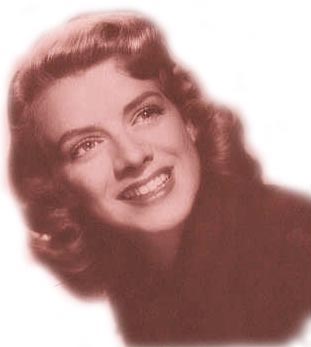
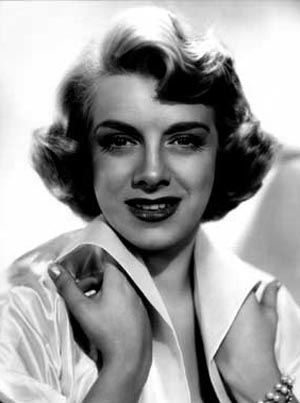
 Mungo
was wild and mean, a high-kicking fireballer with a fierce temper. He
was known as a drinker, and was involved in some bizarre off-the-field
incidents. He once had to be smuggled out of Cuba to escape the
machete-wielding husband of a nightclub dancer with whom he'd been
caught in bed. His career went downhill after he injured his arm in the
1937
Mungo
was wild and mean, a high-kicking fireballer with a fierce temper. He
was known as a drinker, and was involved in some bizarre off-the-field
incidents. He once had to be smuggled out of Cuba to escape the
machete-wielding husband of a nightclub dancer with whom he'd been
caught in bed. His career went downhill after he injured his arm in the
1937
